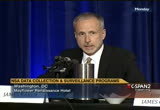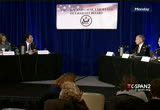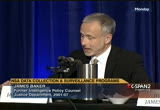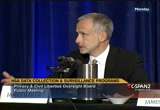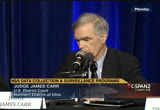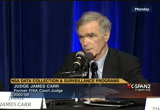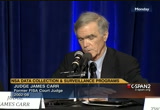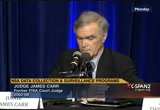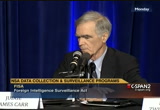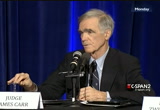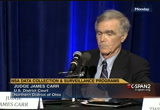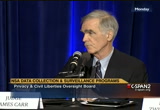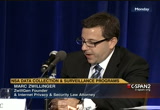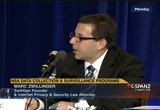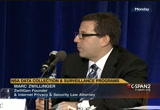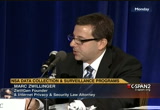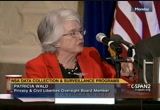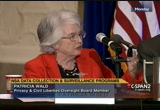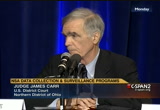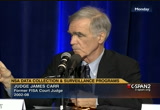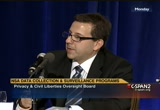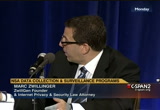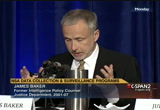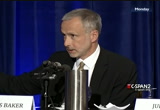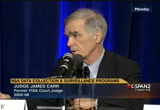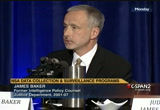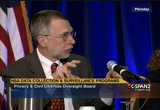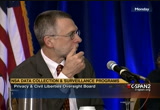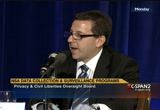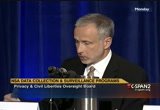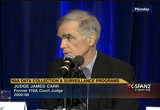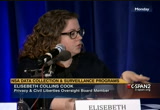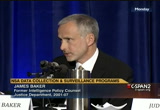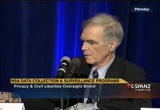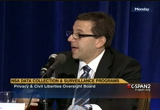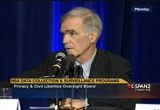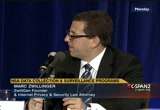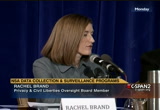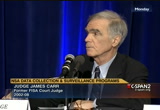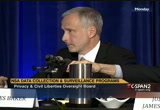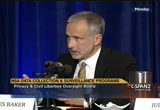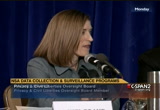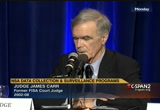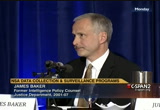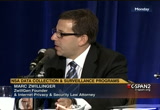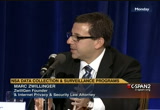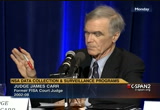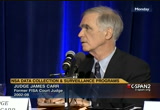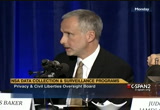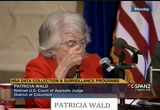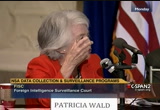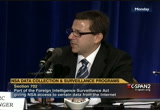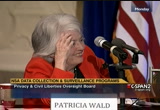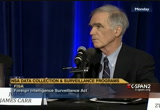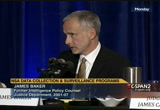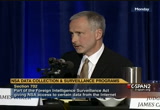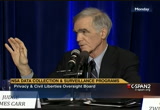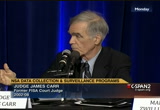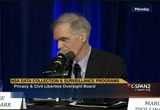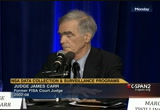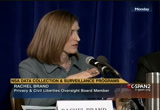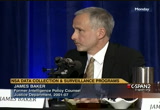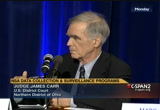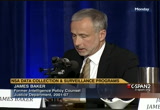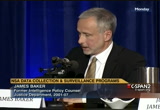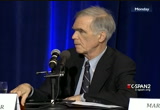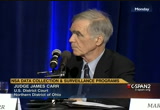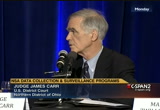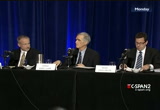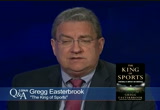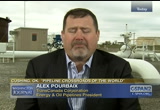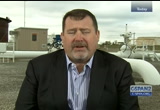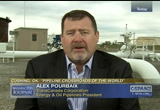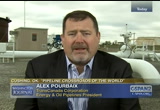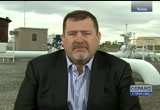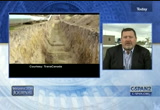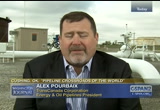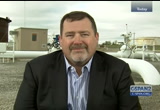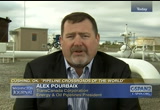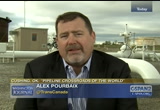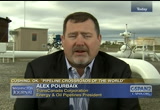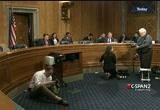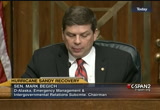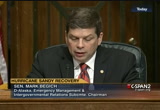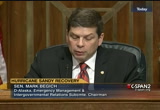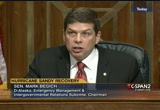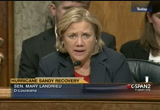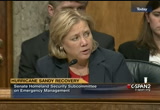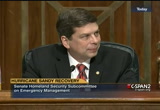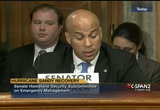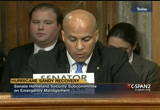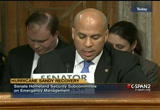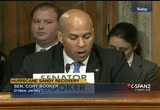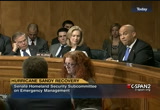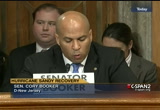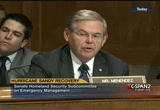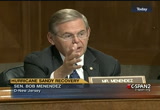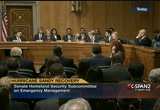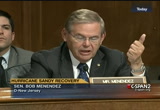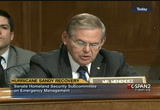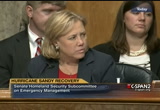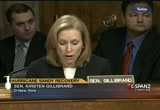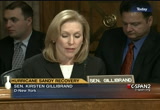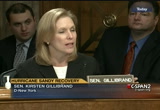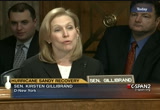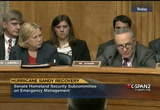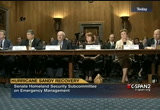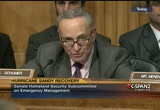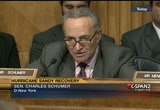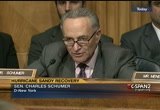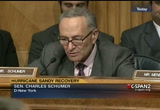tv Key Capitol Hill Hearings CSPAN November 6, 2013 6:30pm-8:31pm EST
6:30 pm
on section 702 of the fisa amendments act and 215 of the usa patriot act and i would say while these are very important statutorily authorized initially reviewed warrantless surveillance programs involving the collection of canned occasions and communications related data with respect to many americans they are part of the story and i think that was discussed this morning in a panel that i was able to attend. in particular is the panel is aware the government conducts surveillance activities using a number of different authorities especially including outside the united states under 12333 and i would submit to the board as you are evaluating these issues you think roughly about them because the privacy issues you are confronting to pop up in different contexts and is another example with respect to telephone records, telephone calling records there are several ways, eight to 10 by my
6:31 pm
count sometimes depending on how you count them eight to 10 different ways the government can go about obtaining the same types of records you are talking about when you are talking about 215 so it's critically important but it's only part of the story. i would urge you to think broadband as i mentioned the last time i was here i also want you to think broadly because it has not been discussed very much is cyber, and the need to think about the critical privacy issues and the data collection issues as they pertain not only to conquer and terrorism but also to cyber and i'm happy to talk about that at length if you are just it. the i would like to make at the onset is the surveillance intelligence court that i've worked closely with for many years when i was at the tip arpanet justice and i can elaborate at length if you want me to but in many ways i would say notwithstanding much of what has been written in the press
6:32 pm
fisa court is the national treasury. it has done its job in an exemplary fashion during wartime and i think that is not been set enough so i just want to say that at this point however the fisa court is not some type of super inspector general over the whole apparatus we have to collect intelligence. it's a multibillion-dollar enterprises conducted by thousands of people. that is not what the court does and i think with respect to 702 and 215 i would submit we have reached the outer limits of what you can reasonably expect the court to do in this setting and i'm happy to discuss that at length. at the end of the day to my mind it's the responsibility of the president the executive branch and congress to conduct the measurement oversight and control of these types of activities. i'm happy to talk about transparency and the issue of whether we will have that happen again or something like that in question so thank you very much.
6:33 pm
>> thank you mr. baker for coming back with us again. >> like jim baker with whom i worked for five or six years i can't recall whether you had left before i did or not but i'm pleased to be here as part of the conversation. you may be aware that as a result of an op-ed that i happened to publish on the 23rd of january i think it was making what i consider to be a very modest proposal which i will repeat this afternoon to improve both the process of certain applications before the court and perhaps enhance public confidence in some of the decisions the court reaches. that proposal is quite simply that the congress gives the fisa court judges either the discretion or perhaps directs them to obtain the services of
6:34 pm
outside independent counsel when the cord is presented with something that is new and novel. this would happen on very rare occasions. one of the things i want to emphasize is how frequently this kind of her as an patient would be necessary. the vast majority of the fisa applications is the low probable cause standard working on behalf of a foreign government or foreign-based terrorist organization. that's the probable cause showing. once it's made we have to issue the order and we don't have the discretion to second-guess the purpose or reason. on in frequent occasion i felt as a sitting judge when jim baker and he was the one who would do it, would come to me and say judge you had better pay special attention to
6:35 pm
paragraph 62 to 73 because it's a new technique and their something new and unusual that takes it outside of the ordinary quite straightforward and typical routine fisa application. the government would do that and do it for good reason because they knew we had to trust its integrity in order for us to function effectively and have confidence in what you are saying to us. that requirement became codified in the first draft in 2008 of the foreign intelligence surveillance court rules and the government is required by those rules in that sort of situation to call that circumstance to the court's attention. i'm sure it does so. that seems to me to be a good trigger point for a judge either to have her discretion or perhaps for congress to mandate a rule 11 notice given and then the court calls upon what it of what i would envision to be a
6:36 pm
small cadre of precleared attorneys, probably within the washington area, probably with some sort of experience in this area. i would certainly hope so so they wouldn't have to spend a lot of time learning how the wheel turns as it were that individual could come in and that circumstance and if called upon to do so will could represent the interest of the constitution. the fourth amendment and the rights of all of us to come indications privacy. it would be very infrequent or occasion where this would be necessary. i want to underscore that. and i think the benefits to the court through the process would be quite substantial. first of all we judges are accustomed -- it's how we work through the adversary process and what do you say is how we usually make decisions.
6:37 pm
secondly, when the government wins, when the judge says yes you can do this or that it has no interest in appealing. it does not to get -- did you get that order review. it won't go to the fisa review essay by the way you one but nonetheless, however in that circumstance when there is a new or novel tech meek or some other aspect where the court has called upon an individual outside counsel, that individual would be able to appeal. a secure appellate appeal which does not presently exist and an appellate review in my day-to-day functions as an ordinary article three-judge is very important. i get reversed and they are times when i get reversed and i say my gosh i was wrong. finally and this has occurred to me since i first wrote the op-ed piece it seems to me that this
6:38 pm
outside counsel and i don't have a name for it yet could also perform an important role with the troublesome issue of noncompliance. once again the government is required to report instances on compliance. he it did so when i was there and in every one of those instances it was fairly trivial. it wasn't troublesome. jude former presiding judge bates' lengthy opinion released earlier this summer suggests there may be instances where reports of noncompliance are of the sort that once again as a judge of the foreign intelligence surveillance court it might be useful to have the discretion to reach out to somebody to resist the court and understanding the issues and ensuring that once went wrong has been fixed and does not have any serious clause to it or if it does to see that gets fixed. at some point i hope the legal
6:39 pm
advisers -- because their work for the court is absolutely crucial. i don't think it's well understood that anybody outside the court and the role that they play is extremely important and i hope perhaps they have a few minutes to talk about them and their role and where it fits in everything. one final thing and you alluded to this but it's my view that we should all keep in mind when talking about foreign intelligence collection were foreign intelligence function of the agencies charged with that responsibility and then the dignity of the judiciary it's a very limited activity under the foreign intelligence surveillance act. if you look at article too and of course that's the article in constitution that establishestablish s the office of the president gives the president his responsibilities
6:40 pm
and authority, you don't find the word judge in there at all. this is a very unique circumstance where the third branch actually plays a role in overseeing the activities of the executive. in an area in which the executive constitutionally has exclusive responsibility for the conduct of our foreign affairs in dangers and threats so i look forward to your questions and it's a real pleasure and an honor to be here. thank you. >> thank you judge carr. >> thank you for inviting me as well and especially sitting next to judge carr created as the board knows over the past 13 years i have helped dozens of clients respond to government demands for customer data both in criminal cases and under fisa. mike clients have ranged from small or fighters to large tech companies like yahoo! and apple and although my representation of yahoo! before the fisa court
6:41 pm
is the lag here today my comments are entirely my own. that said my client work is given me a view into the position of writers and service providers who receive demands under fisa and has helped me seem to aspects of the process which i believe are inconsistent with the core principles of our legal system. first the over broad cloak of secrecy that applies to everything buys a related and the lack of the adversarial process. together these pose difficulties for providers and by extension their users and the public. to begin with when providers are served with pfizer orders of directives they are receiving and on to my process containing few specifics which they can review only for a brief. of time before they have to give it back to the government yet based on a i cleanse their being asked to disclose the most private user communications they carry. providers have few places to turn for advice and while some have experienced counseling for
6:42 pm
the routine of the type the judge carr suggested providers with limited resources struggle to understand much less that the way to the process they get. yet providers are the only parties with the statutory authority and the opportunity to challenge these orders before they are executed. indeed section 702 is designed right now to make them the last hole work against government intervention because the court is not giving the authority into a full lawfulness review of 702 directive unless the provider first initiates a challenge. a decision by provider to challenge must be made along under acute time pressure and sensitive baby to what's at stake with little context under a gag order. when providers to bring a challenge trying to litigate an adversarial way in the fisa court is an uphill battle. even now the rules for filing said there barely been tested in the logistics in handling classified information is
6:43 pm
difficult in filing with the cord is like getting a letter to santa claus. it requires a lot of blind faith. the rulings come down the same way. anyone appearing before the court the government regularly submits ex parte papers that a providers not permitted to read even if it's represented by lawyer with the right clearance. this happened recently. my second case in the fisa court is declaratory judgment brought by five providers seeking the right to disclose the number of intelligence processes they received. just the numbers for each process and to oppose this relief the government has made a secret filing to justify why the disclosure will cause harm that would outweigh their first amendment interest that has refused to let even clear council see that filing. as you can imagine it's hard to respond effectively to something you cannot read which means even in the adversarial proceedings the court is hearing only one side of the issue. in light of these issues i think relying on providers who have to toil in secrecy in plying the
6:44 pm
court with one hand tied behind their back the last check on her government is not a deal which is why the creation of a special advocate who would have the same access to classified materials as the government could make a real difference. as judge carr pointed out judges are used to making decisions after hearing both sides of an argument. that's the way our system is structured and that is what makes structures informed and legitimate. the other side of the argument not just in the extremely noble cases but collection cases in other cases as well the other side is represented. the advocate can weigh in on the novel issues that come up before the court and serve as the potential missile is for providers who want to challenge the compulsory process. we need look no rid of in the odd logic and declassify decisions to see what happens when the court and the government work through the issues without any balancing input and even if decisions would have come out any differently and if the court it heard from advocate adding a
6:45 pm
voice for legitimacy with would restore faith in the courts decision-making. a look forward to or further discussion on the special advocate and further issues. >> we will start with judge -- >> thank you. i surmised from the morning panel that government as well as many outsiders have commented are reasonably comfortable with the idea of the fisa court being able to call for an amicus to help them with particular novel issues of interpretation. i also think that judge carr and many other people who have commented on the outside are suggesting something that is a little bit strong and a little bit more energetic than that, namely that you would have a body of outside counsel so i
6:46 pm
would like to pin down a couple of things initially with judge carr but certainly with other people's reactions too. that would read if you had such a body of advocates with secure clearances on the outside, do you think that it should be entirely in the discretion of the fisa judge to decide when he or she wants that kind of help? more specifically i think because judge carr raised the problem of the peel and they think less of us whose experience is familiar with regular article three courts is that the appeal is a very necessary part of the process. now there have been constitutional questions raised by other people about whether or not apart from the provider if
6:47 pm
you try to give an amicus or an appointed, someone appointed from a panel of secure lawyers the right to appeal you might run into constitutional objections. so i think those two basic questions about whether or not you would leave the initiation of the appointment of such a person entirely in the hands of the judge and whether or not once that person was in and participated in the lower court for seedings, should that advocate whatever you want to call them have that advocate constitutionally be given some right of appeal? >> let me say and try to analogize. i do not think that an office -- an outside office that we use every single application is necessary. my thought is, how i envision this is to have a relatively small number of attorneys,
6:48 pm
something like cj panel and ordinary criminal justice panel who will and time gain experience because of their small number who are completely wall-to-wall security cleared. this race is something that i hadn't really thought about but by all means i think that individual should have as complete access to everything the court is hearing as the justice department prosecutor has and there should be no withholding, no secret filing or whatever. i actually hadn't thought about the constitutionality of being able to appeal but one of the most important aspects of what i'm proposing because that would give the opportunity for further review by a three-judge panel of foreign intelligence surveillance court review would give those three judges a chance to look at it again and perhaps
6:49 pm
to secure a supreme court review but i can't answer your question about that. i'm not sure i should as a judge but nonetheless i don't know. finally in thinking about this further i think that under some circumstances it should be necessary for the judge. don't let the judge have discretion. in other words this is what what i call the rule 11 notice is given then i don't know whether witcover -- i think the witcover something like the prison program or something. that was my intent but also get give the judge the option. sort of two-handed so it's not just one rule and that can be a trigger but then the judge can retain discretion to reach out but it would be a small group of lawyers, pre-cleared gain experience and again i think use relatively in freak holier perhaps this just occurred to me
6:50 pm
when a provider has an interest and a provider wants to appeal perhaps the provider could also request that the court appoint an outside attorney. >> it's i could jump in on that for a moment though. i would undoubtedly be one of those attorneys. i'm the only private attorney to the diva for the clerk review. i don't think it's enough. that is we talk about the constitutional questions of letting somebody have a standing to appeal. the court believes it doesn't have the power to force the executive to make the classification decision differently so the executive is not going to provide the private counsel with the full access to the classified material that would be necessary. certainly not on a historical basis. that is maybe for the particular case but an advocate would know two years ago the solicitor general stood up and made a representation to the court that for example as happened in the director's case that there is no database of incident we
6:51 pm
collected person's communications and only an advocate who had done in several cases would know the representation of of the government makes in one case may be inconsistent in the representations made in another. as much as it is a much business interests i would love there were a small group of exclusive right to practice before the court i don't think would satisfy the interest of protecting the constitution because by definition that group be limited. i would love for the special of it has to be able to bring the help of outside counsel on the panel you describe to bear on a particular case but i think there has to be someone with an institutional interest that would look across multiple cases and be able to challenge the government's programs not just in the one case that they practice in. >> thank you. mr. dempsey. steve do you have any thoughts or comments on what we are talking about here? >> i will try to be brief. you are trying to break it down to speed and agility and the government ability to move quickly without adding more
6:52 pm
process but there's a lot of process already so we will add more under these proposals. another issue is intruding on the article of authority to an even more significant degree. everybody agreed i think when fisa was enacted that this was important. this is what the act is all about. it was justified for friday of reasons back then and it may be reasons to have it now. we have to be mindful that is what's happening and i'm worried about delegating to others whoever it may be the authority to disclose information, classified information to yet another party. i also worry about having an outside panel and the concept of an advocate versus an amicus on a case-by-case basis but the main thing i'm worried about frankly is just leaks of information. one of the things, it's hard to prosecute a lease case of the criminal sanction is there but
6:53 pm
it's hard to actually use. something that everybody who is in the system has to do with is if they decide they want to leak something that fact that they may lose their job. they have skin in the job that's real and important of them unimportant or their families in the have to think long and hard about whether this issue is something i want to leak something about. so i am worried about this on a variety of different levels and i can respond to any questions. >> something just occurred to me. it seems to me that first of all perhaps you could create these people as some sort of small group somehow federally employed and appointed at the federal public defendant. it occurred to me there has never been a fisa league via anyone affiliated with fisa office court as far as i'm aware and i'm not talking about a large number of people but as importantly the lawyer might be
6:54 pm
difficult to prosecute them but it wouldn't be hard to take his license and his livelihood were he to leak so i think that's something to keep in mind. the idea of a federal appointment, the more i think about the risk of losing the license plus the public shame and disgrace and the potential risk of being prosecuted, i think at some point you have to have confidence in the people who pass these kinds of security clearances that they will do the job and maintain classification. i would like to ask one series of questions. in response to judge walden i don't know. can congress mandate to meet in the concerns about withholding classified information for this outside counsel or whatever you call it. can congress include that say that person shall have the same access to all documents and
6:55 pm
information classified or not that the government has? i don't know. >> that's another constitutional question. >> i'm not a seed the expert but by and large the classified information procedures act setting a criminal case the government cannot be forced to disclose information to a defendant. the government can be forced to make a hard decision on whether to prosecute the person or the sanction or may suffer for not disclosing information to the defendant in disclosing the case. at the end of the day i think it is a significant constitutional issue whether you can force the government to disclose classified information to someone the president does not want to. >> with the analogy of the situation would be basically the court would in essence say if you want to prosecute this person you need to make this information available in this way. if you want to get your order you need to make this i'm not owing to rule on this until i'm
6:56 pm
sure i have had both sides of the story for. >> you have to figure that out. >> as a matter fact it would make sense. condition disorder well we are going to play with the level playing field and all the cards on the table and that may be a way around it. >> one quick question. there are two related ideas that play. some people talk about the special advocate in and some people talk about amicus. it's possible or is it possible that you could have -- sometimes you would have the classified lawyers the sort of cadre handful of people pre-cleared etc.? in at least one case the fisa court review has invited noncleared amicus to comment on a question of law.
6:57 pm
is there any possibility that could happen in first impression when the application is first presented that the court could say all the details are secret but there is a question. is the law the one where the amicus participated in an unclassified context had to do with the wal? you could have a hybrid of both of these. do you feel that, yes or no? >> i was trying to think whether for instance the prison program itself because it raises fourth amendment questions. someone pointed out the reasonableness clause of the fourth amendment and i think that may well be in play. i think smith is not a particularly reliable basis. my problem i am not sure you can
6:58 pm
so easily untangle the secret from the quote pure question of law. mr. zwilling or might have a better grasp of that than i do the. >> in the 2008 case the question was whether the lawfulness was a directive and the court relied on the targeted procedures to say that procedures were in place where sufficient to provide constitutional protection. had it not been for the leaks it's not clear we would have ever seen them. to our view even if you are in the case or as amicus without seeing some of the factual basis and makes it difficult to present a constitutional argument whether the state guards are sufficient. >> thank you. >> many of the circumstances that i have raised in new and novel methods of collection and of going to point to the prison
6:59 pm
i.d. itself. there is an intersection between the technology that keeps getting -- running ahead of the law title iii and everywhere else and that is part of the problem too but i'm not sure it's quite so finally sliced. >> going on something you talked about with the technological advances what is your understanding of the fisk's current ability to use technical experts and technical consultants? is that something that the fisk fisk -- we have heard competing views as to whether the fisk can do it and doesn't do it and should it do it more and thinking about new technologies or to try and avoid what we have heard to be a problem of miscommunications from technologists through the lawyers to the judges. i asked the question whether
7:00 pm
there is all -- already that capacity? >> keep in mind i am not in the government anymore but i would say you put your finger on an important issue the game of telephone where things get transferred and it's a real problem and it's a significant problem. .. d to bring in an expert from the outside, perhaps from one of the company's market is talking about, i do not see any reason that cannot be made to happen. i don't see that as being something that would not be possible to do. you would have to bring in someone who has a clearance, figure out what kind of questions you're going to expose this person to, what kind of information.
7:01 pm
there would be some security questions around that. i don't see that as something that should not be possible. >> does anybody else want to opine on that? -- back inknow this 2002, part of my experience as a rookie fisa court judge was to visit agencies. -- visit agencies and be shown and told about what is the flip so that the flip phone -- what is the flip phone of technology. we had one opportunity and we took it to be informed of our particular type of activity. i cannot go into any detail. i'm quite comfortable that this can be reached within the government. i do not know why we cannot reach outside the government -- so we can understand what everyone is talking about. >> you were talking about shiva .s a possible analogy
7:02 pm
the government at the end of the day has the ability not to bring criminal charges. there may be other alternatives for the government to pursue, such as immigration consequences, png's, in vision and variety of things the government can do. you are talking about a situation where you have identified who you believe to be the wrongdoer. does the analogy hold if you are talking about the fisa court where you have a hybrid preventative mission of many of these authorities as well as an investigative? is strikes me it may not be the truest analogy into the situation. >> ia i just brought up -- am worried about, first of all, the president being forced to disclose classified information. i think that is a big issue.
7:03 pm
i think that raises real concerns. to give up president the ability to obtain some type of -- some type of otherwise lawfully authorized statutorily improved collection that is consistent with the fourth amendment, obviously he has to persuade the judges about that. it is a real heart issue. it --aven't start about haven't thought about it until seven or eight minutes ago. it seems to me that as a judge we would, part of the ordinary process would be to say that we have questions. i call one of the oap our attorneys saying i have a problem with this. that would be a fact that a problem, it would not be a technological kind of problem. what it does seem to me that i have the ultimate authority. what ive to give me think i am asking them to give me if they want my approval.
7:04 pm
also, if i turn them down, they cannot show up to the next person next week. they have to come back to the same judge that has turned them down or appeal. i think it is something that is worth looking into by people who thought about it. i will think about the idea myself. if you have this independent counsel, rather than special advocate because that has a different connotation -- or amicus has a different connotation -- if i say i want that person to have all of the information you have, mr. baker, then he has a choice. he can say, judge, we are going to appeal. that may be the way to go. is the way we do things, as judge wald knows. should --ng judge
7:05 pm
judge carr's comments raised for -- judge carr said there was not much of an adversarial role for the court. from the court, he had the right to contact anyone in the government and ask for information. as someone who has been in an adversarial role, i find the contacts between the government very difficult to deal with and overcome. the fact that the same judge who may have been involved may be deciding whether there is an adversarial challenge. it is not a different pool of judges. it is not a district court judge decided there should automatically be suppression. we are going with the same pool of judges who have both an approval and adjective notorious -- an adulatory role.
7:06 pm
>> on the other hand, when the prison application first came in , the subsequent application did not go before the same judge. the independent authority to decide whether or not it could be approved. there is a different sort of process. it does not return to the same judge. on rotation is 90 day expirations. once in a while i would get something that had a year or two, but it was very rare that i got the sequential. i don't think it would be necessary in that situation. i think it would not be. >> more than the judges are playing two different rules, they're working with the government, the executive branch, to improve a surveillance and come back.
7:07 pm
their work into the process of approval but they are also the same judge, the same court that listens to an adversarial pursuit whenever a provider wants to bring a challenge or we create some sort of additional advocate or amicus to bring a challenge. we have to talk about the court's dual role and how to sort that out. >> i use that term because i do not see the difference between what i did as a judge and what i did as a magistrate or as a district judge later issuing title threes. approve andrd processes the same. the laws quite clear that i can order the judge for suppression motion. i don't see much distinction -- in fact, i don't think there is any. as a fixed job and as a article three job -- article three judge --
7:08 pm
>> ms. brown he e m a -- ms. brown? switch gears from the adversarial process to transparency. it is the subject of some of the other recommendations. these questions are more directed to jim and judge carr. how feasible is it for judges to with an eyens toward declassification or reduction later? just assuming we're talking about prospectively as opposed to retrospectively. is this an easy matter, is a complicated, can it be done? it was mike syrians, i do not know about the other judges with whom i served or judges today -- writing an opinion, as we normally understand it, was a very unusual event. with an ordinary search warrant you do not write
7:09 pm
an opinion you look at it, if there is probable cause you issue it as a title iii order. and pfizer order you issue it. >> in the unusual circumstances -- >> what's again, -- once again, when a judge felt the need to write an opinion -- and that is often triggered by a notice from the government, if they notice something is going on that is unusual, and by the work of the legal advisers. they will work on the issues. ofon't remember the number opinions. maybe several pages i wrote, but it was a handful. part of it is thinking about transparency. courtnot like an ordinary were day in and day out you are writing your opinions. -- whatry to figure out you do not want to have is a
7:10 pm
reduction in this nonsensical because of the reduction speed how easy is it to write something that could be -- of the reductions. how easy is it to write something that could be -- written byarly was the judges to publish it. they boiled down the classified stuff. the legal analysis and historical background and so on and so forth, they were able to put forward in a way that made sense. it wasn't like a piece of swiss cheese. you can understand the logic. the classified stuff was concise. case clearly -- amicus participation was feasible. there was something about that case that lent itself to public participation and publication thereafter.
7:11 pm
how translatable is that? if you were to have some act of congress that said, to this -- to the extent practical opinions of the fisa court shall -- if they were forced to do it, basically. i think they could do it in many instances. there will be some instances where it will be more challenging. some of the technical ones where the fact of the case is interwoven with legal analysis. in the fiscal review decision it really was a legal issue. it really wasn't a factual one. factual or even technical kind of issue -- actual or even technical kind of issue. the court had that it had to do that. another option would another option might be if the court were to release an
7:12 pm
the keynotescase, or something. >> let me ask you about that, because we heard from another that he would rather not see summaries because that is not always a full picture. do you have a view about that? will there be a -- an unclassified summary versus a redacted summary? do you have an opinion about that? >> it all depends. ?hat is the issue doesn't really involve something -- and doessified it really involve something that is classified? can you recast it in a way? there is the likelihood at some point of publication of part or all of the decision, then
7:13 pm
certainly a judge could go into writing whatever he or she wrote and with that in mind, deliberately, apartment alive's and right -- compartmentalized and write about that. it might depend on the particular issue. it might be easy. it might be impossible. i like the idea of a summary. further details this is what is happening. i cannot really answer your question directly. i'm sorry. >> it seems to me you are trying to find balance between unnecessarily disclosing classified information that would harm us and providing adequate transparency for people to understand what is going on and have confidence in the system.
7:14 pm
it is a balance. on the one hand you don't want to have no transparency, and you don't want to have tv cameras in the courtroom either. is for at make sense couple of different options for the court to pursue or have available to give transparency to figure out what is the best fit in this particular -- each particular case. role of thehe person, whether an advocate or staff attorney or whatever when they appear before the court. and secondly, -- two questions. first, is there something that takes charge of everything the government proposes? and how do they evaluate which arguments to make? there are statutory argument, constitutional arguments -- how do they make those decisions and who guides them in their strategic decisions that they make?
7:15 pm
we will start with mark and go on down. think they should oppose everything the government seeks. the goal is this not -- the goal is not to make it harder for the government to protect the country. the goal is to make it simple for the government to protect the country while supporting the constitution and to have someone on the other side pointing out the constitutional balance versus the need for security or surveillance. as for how to decide what cases to get involved with and what arguments to bring, i think the first person to occupy the office should play a large role in figuring that out. it would occur to me that novelty is one thing. as far as focusing on when they should get involved, it is get about how they should
7:16 pm
involved. lawyers strategize. it is probably based on who their client is. how does each particular person make those decisions? >> to try to get at that in a short answer, i would think you have got it right as to who their client is. they view it either as the american public, or in some places, the human race that has some sort of human dignity and privacy in their communication. ther client is to offer perspective of those individuals who cannot be there tuesday for themselves as to whether the surveillance is -- who cannot be there to speak for themselves as to whether the surveillance is merited. it is hard to choose between them, but i would think they would be empowered to make both of those argument, statutory and noncompliant and constitutional. >> certainly, they would have the ability to make whatever argument they thought was appropriate, just like a lawyer in any other instance whether it
7:17 pm
is in trial court or appellate court. i would think the lawyer would do -- would be able to make whatever argument he or she thought was possible and credible, and perhaps successful. in a unique situation, calling to the government's attention that -- to the court's attention of the government isn't, if that lawyer thinks it is worthwhile. me -- and in the system i'm trying to propose, it could enable this -- lawyers often when confronted with new or difficult issues talk to other lawyers and get their import -- their input. what do you think? that is a natural source for where a lawyer would go. thes getting more elaborate further we talk, but on the other hand within the confines of what i'm suggesting, i think thisould also enable that small group, just like a small federal a look defenders office,
7:18 pm
they talk amongst themselves. they are privileged. nobody can make them disclose it. and you bounce ideas off each other. when these issues come up in front of the fisk, no one has been there before. you do not have precedent. and you have to think things through in a seminar kind of way. that is one way that lawyers would -- i'm sure mark does that with his client and others in his office. what do you think? that could be held. i don't think we have a template as to how that would occur, but again, that lawyer would have as much opportunity to raise whatever arguments the lawyer thought were appropriate as to government and classified information. and now when i think about it, at least within that small group talking amongst themselves and jointly coming up with how they go about representing. think that lawyer
7:19 pm
will be called upon to dream up arguments just to dream up arguments in opposition. but he will say, we have no opposition to the government's request, end of discussion. there are lots of issues associated with this type of function, office, whatever you are going to call it. it seems to me the one thing you would want to do is to make it clear to the people that this office is independent and can decide whatever legal position it wants to take in any particular matter. constitutional issues, statutory , he would haver to leave it up to the people in an office or whoever it is going to be to decide which approach they will take. it has to be independent. >> we have time for another brief round. i've just got one question.
7:20 pm
i'm returning to the appeal question. i recognize that some of you have not really had the chance to research, or don't wish to comment, but i want to raise this question. we have been talking about the fact that the five the court is kind of a unique animal. fisa court is kind of a unique animal. it has been thought of as an article three court, but it has been pointed out that it has some sort of auxiliary function with approval. here is an argument i share with judge carr. this court inevitably must, and has, print out constitutional questions, questions of whichory interpretation, have to become part of our, to the extent that they are a
7:21 pm
disclose, part of our jurisprudence. that i think me is it is so important that not only do some of the fisk council have the opined on the constitutional service, but they are applying typical traditional article in a situation where the court is siding -- the threecosts siding article is in question. but it is devoid of one of the most important parts of article three courts, namely those who have an interest in the preceding not being able to have any voice. for good reason, and i understand secret see -- the secrecy involved for national
7:22 pm
security. but i'm trying to pick your brain as to any way to solve that question. because to leave this at the highest form of jurisprudence, namely constitutional questions and sometimes those with statutory construction, at a point when they cannot be unveiled in any other process that jurisprudence has even up to the upper tier, even to the fifth, some have suggested that kind of certification, that has had its opponents, too. do you have any positive thoughts? >> i will take a shot at it. i hate to keep coming back to the 2008 court of review case, but the government was making the argument that there were not any providers to challenge. in the court ruled that since for them and writes words day, litigating on behalf of the users was not a constitutional
7:23 pm
standing doctrine. it had put in a provision for providers in section 702. i do not see the hurdle as quite as insurmountable. hase agree that a person fourth amendment rights and they were to litigate that on their behalf, it is a question that congress can wait, not a strict constitutional one. at least, that is my interpretation and my offer of help. >> i'm not sure i fully understand the concept of prudential standing. seems to me there are a couple of different circumstances. one may be that there is a target, a person named in the order. and that is easy, you can -- or it seems to me that person could be designated to represent the interests of the person affected
7:24 pm
by this order. i think that is what you are saying. they have bona fide interests. and there is a scrap of document able to bet be commented upon. you have a situation where there is capable of repetition, but it will delay your views unless you , even thoughdecide arguably the particular circumstances now move. also, congress gives courts its jurisdiction. >> congress created the original fisk, and it in a sense, you might say, that -- decided that this body of people could not become a regular participant if they had terrorist -- pre-k's -- >> and it begs the question, can a court oversee any roles like these?
7:25 pm
and they all agreed that fisk is a good thing and five is a good thing and we don't want to push it one way or another -- and fisa is a good thing and we don't want to push it one way or another. keep in mind, although would take is the executive saying, no, we are not going to go along with this. reviewhe fisa court of and whatever it says, ultimately, the supreme court might say that the whole structure collapses. who knows? has never been tested and i don't think we want it to be. >> jim baker, you said in your opening remarks -- i hope i'm not misquoting you, but i think you said something along the lines of, we can go on as far as we can go with the five that fisa court.h the five them would you clarify what you are
7:26 pm
referring to? >> it was the outer limits of what we could reasonably expect the court to do. we should not think of them as some sort of super inspector general that is conducting free ranging oversight of the activities of the intelligence committee. constitutional issues with that. trained to do not that in that way. they play a different role. i am trying to set expectations. i'm urging you to set expectations in a realistic way with the american people about what you reasonably expect the court to do. the same with congress. the -- what can the members of congress and their staffs reasonably excited to do with the oversight of these agencies? it is primarily my view that the president of the united states can take effective management and control and oversight of the
7:27 pm
intelligence community. to theyou go back original point, look at structure 702. you have the court proving these procedures, several different types, different applications, but not really engaging in review of individual determinations and so on. i just think you have gone pretty far in terms of what you can ask it court to do to conduct oversight of the intelligence community. >> i have no other questions in this round. i yield. >> i appreciate the witnesses being here. it has been very helpful. oni do want to take you up advice you had given us earlier about legal advisers and what role they play. there is definitely a sense, and i mean no offense having been a law clerk, but the fees for junior attorneys having been law clerks, i wonder if you could talk more about who the legal advisers actually are and what
7:28 pm
role they serve. >> when i started in the court in 2002, there was one legal advisor. when i left, i think there were four or five. i can't remember. clerks noreither law magistrates. it is a unique role they perform. i think i can speak for myself when i say -- and i'm the author of the treaties and surveillance, so i know more than most of the judges going into it, but they know more about the workings of the agencies than any individual judge can. we rely upon them to assist us in making decisions. to give you an example, they get by fisk role, seven days before we get, and application, and they will read through what is called the read copy. and jim will confirm there is a lot of legal push back between the legal advisers in the court and the oi pr.
7:29 pm
i know from personal experience there is a lot of pushback and thethe oipr agencies. someone said this morning that they don't want the junk, because if they do, we will lose confidence. it will be much more difficult unless they are straight up with us. -- and legal advisers not infrequently, i would come in and have, let's say, x number of cases sitting on my docket, and that number grew substantially well i was there. case,would be told, this that case, and some other case would be off docket. it would not be formally presented to me for review because of the interaction between the legal advisers and the oipr attorneys, and the agencies. that was a core part of their
7:30 pm
rigorously doing the applications. one of the things that i think should be considered would be than -- the instances within which an application should be submitted to a legal advisor, but never submitted to a fisc judge for consideration. should be too, registered and recorded and published. , but jim,rcentage, no would you agree with me that fairly regularly cases would come off docket yet >> or they would come off and be replaced another week because they were trying to resolve and finish the analysis. >> right, but i don't think it would be difficult to give every read copy a number. and then if it comes off-topic -- off docket and they decide
7:31 pm
never to presented, then nothing else shows that the rate of rejections in terms of the overall operation of the court is higher than a simple turn down by a judge. but to say that these are law -- they occupyow a unique role. they work for the court, but in a very important way they help to ensure the decisions that we make. very often, they would write a memorandum for us about some aspect or other. and then we would sit down and read these things. and they are not two-page search warrant applications. they are 40, 50, 100 pages. they are very thorough them every bit as lengthy as a title iii. oipr and say,ll
7:32 pm
would you give me this or that? on occasion i would have hearings. i would question the agent and the lawyer under oath flow -- under oath. and i would make a finding and determine that my questions had been answered. >> thank you, all three of you, for being here today. part of what we are doing here educatepting to ourselves, part of what we are doing is attempting to educate others who may be thinking about this. so i appreciate the thought and time you have put into your answers. >> and certainly, speaking for myself, if there are other questions that the agency has, we would be happy to answer them. >> thank you. i want to follow-up on something i had asked the government about and we did not get into a full answer on that panel.
7:33 pm
jim, i think you are in the audience for the discussion requirementse were that the government submits to the fisk after the fact, the phone number is now a selector in here. the paper trail is the basis on which the selector is established. what would the court do with that? would this be an actual check on the system? would it overwhelm the court? could either of you speak to how that would work? >> i don't see how it would overwhelm the court. >> it would or would not? >> it would not. you have a spreadsheet. you write down the selector. you write down the date, time, all of this stuff. and it is not too onerous for the government to comply with.
7:34 pm
i think that is a real issue. and i would imagine if the court were to look for real patterns. if things were to go along that is -- in a way that is consistent with the understanding of what they are thinking their approval is, that i would have to say that is in check. i do think it would be useful for the court to have additional transparency. and it seems like something that would give the american people that what confidence is going on is legitimate and appropriate. >> to do that, first of all, the periodics of the reports that all judges get through the wiretaps. again, it is all on the record x rte.ake -- ex pa if you are doing a good job, minimization -- if you are not.
7:35 pm
seems for it to be useful, you would to go back to the particular judge who issued the prison order, whatever the order was. >> 215. >> 215, yes. to go back to that judge that gave the original authority, rather than whatever judge happens to be there that week. .gain, i don't know but i suppose, in time, any judge would have developed the familiarity to be able to have developed reasonable articulation of suspicion in this context. >> and there was some discussion and back and forth about the courts and the lawyers in the government. can you talk about this back- and-forth that happens within the government? is there a quiet sigh adversarial -- a quiet the adversarial process within the government?
7:36 pm
can you talk to that? >> it depends on what kind of communication, whether with the fbi or the nsa. with the fbi, you have review in the field office. you would review at the fbi justiceters or, to the department and have a review there. and it would go to fisk and you would have a review there. and thee review meticulousness and the care that people put into these things is substantial. of dialogue back and forth between every level, among every level with this. there is back-and-forth with doj and fbi. i always took it as a huge amount of my response ability to make sure that i maintain at all times the credibility of the justice department in front of the five the court -- fisa court for muscle it was
7:37 pm
transparent what was going on. and when we made mistakes, as we did, we brought them to the attention of the court and we tried really hard not to make mistakes. it was really the justice doingment in my opinion his job, executing its responsibilities to order the constitution and the delegates were there to make sure that the properly.ecuted we will do our best to make sure it is enforced in the right way. if they have not met the standards, we will tell you if they have not met the standards yet, and they have to x, y, and z to do so. i think the system has worked well so far, but it is clear to me now and painful to see that some population of the u.s. is -- does not think that. we've got to figure out how to deal with that. that is your job. >> thanks. just one final question.
7:38 pm
the point we made earlier that this outside party advocate makes is that i have a role in compliance reviews. what role would that be e and how -- what role would that be? and how would that play out? many times, -- this is really quite straightforward and simple. but in the event that you had something that was more complex and you wanted to be really sure the problem had been identified and addressed and would not that, but again, i think at least the fisa judge should have the opportunity to have the toependent counsel and participate in an adversarial mode with the government prosecutor and conduct a hearing , like we do with a suppression
7:39 pm
hearing or whatever, and then make a decision. one would hope that the decision would ultimately be ok, things are not as bad as they look. and things have been fixed. but i do think there would be a for the attorneys to participate in the process from time to time. >> do you have numbers on that? >> it is not a career enhancing move for somebody in an agency to make a mistake, to get it long -- wrong. and one of the things that impress me as a young magistrate at the -- about the effort bia and -- about the fbi and cia so forth, one thing i can assure you has impressed me from day one with all of my activities with the fisa court is the people who do this work want to get it right.
7:40 pm
not just the lawyers in the justice department, but the agent out in the field. and the other thing i want to say -- and i have alluded to this before -- i know that at least the fbi on a frequent occasion was not happy with them because they were not going forward to present some that the euro very much want them to. adversarial relationship, but certainly not hand in glove. at least when i was on the court, one did not have the sense that they were presenting anything the agency wanted. >> i would be very careful about using the independence of this office to start getting involved too far in what would possibly lead to the capture of executive branch activity. we believe there is some role be on this process, some role that most advisors have found to be brilliant and play. and they should not look to play
7:41 pm
too many roles in this so they of thiallenge the independence panelists . we will take a break and resume at 2:45 p.m. >> may i say one thing that occurred to me this morning, and also before the senate judiciary committee? let's all keep in mind the remarkable country we live in where we are having these kinds of -- conversations. i don't think any other country has anything like it. can you imagine this kind of conversation occurring anywhere else in the world? i think we should all keep that in mind and take pride in that. >> excellent point. we will take a break. thank you. [captioning performed by national captioning institute] the senate armed service committee tomorrow morning hold a hearing on the sequestration
7:42 pm
budget cuts. testifying before the committee, the army chief of staff and general james amous, command daunt of the marine corps. it starts at 9:30 a.m. eastern on our companion networking, c-span 3. unlike -- ike who grew up in a poor family. she was from a well-to-do family. she attended a finishing school. we have her report card from school in denver, colorado. while she got a b. in english, she actually got a c minus in european history. who knew in later years as a military wife and future first lady she would be well traveled and have so much to do with european history. she loved charm. early on ike bought her west point football charm showing the
7:43 pm
army and navy game scores in 1913 and 1914 when ike was coach for the army football team. she took great pride in creating home in the each 36 places they lived throughout their marriage. watch our program on c-span.org/first ladies. or see it saturday on c-span at 7:00 p.m. eastern. and our series continues live monday as we look at first lady jacqueline kennedy. the places now called the her mercedes-benz new orleans. built entirely public expense after hurricane katrina badly damaged. when it hosted football games it was a national feel-good story. i would say so. the public paid for the repair. the public invested in today's dollars about $1 billion in the
7:44 pm
construction of the mercedes-benz super done. the man who own it is keeps the revenue generated there. why don't people rebel against it? many people in the public don't understand it's taking place. i think the second reason is, they feel there's nothing they can do about it. it's all based on insider deals. and it is largely based on insider deals. the most recent time there was a vote in miami last year there was a vote on whether to use public money to renovate the place where the miami dolphins played. and the citizens voted against it. they got vote on it. more with the king of sports author sunday night at 8:00 on c-span's q & a. tomorrow's "washington journal" focuses on renewable energy. first an overview of the renewable energy.
7:45 pm
right now on c-span2 from this morning's washington journal. the president of the transcanada corporation discussing oil and gas pipelines. >> host: thank you for joining us. let's get started here. f you're waiting for the state department to do their finalo review on keystone x l. from earning reports released rd yesterday, it showed that the company has spent $2 blion yesterday xl pipeline. what have you spent that money
7:46 pm
on so far? guest: greta, it's just the usual things you spend money on those types of projects. in order to be in service at the time where we were anticipating, there's a lot of long lead time items. there's pumps, there's actual pipe all of the various control systems we had to buy, put those orders in early. that's probably the lion share of that amount of money. there's obviously hundreds of environmental studies that need to be done. land surveys, it all adds up. i would add that the vast majority of that equipment came from american suppliers. guest: what about jobs for building? you built the south leg, that should be up and running soon i understand. what type of jobs are there for building pipelines in this country and how much do they pay and what about the over all job
7:47 pm
numbers of keystone xl? guest: this has been an area that the opposition has made very misleading statements and just plain old lies. you talk about the gulf coast portion of the keystone xl pipeline where we're finishing building now. that pipeline is much smaller than the xl pipeline. we employ directly 5000 americans in constructing the pipeline. we will employ another 9000 americans and we are right now employing 7000 americans in manufacturing the pipe, the pump, the control systems that are required for these projects. the reason i can be so specific is we can actually identify each and every one of those workers on our pipeline and manufacturing. those are hard solid numbers. keystone xl along is about
7:48 pm
$5.5 billion project. crossing a number of states, these kind of projects really do produce a great number of jobs. you asked how they're paid. they are very high paying jobs. most of these jobs are union jobs. you can see the job impact when you see union partners how hard they're pushing in d.c. host: how are you addressing the environmental concern? we heard from callers today talking about how tar sand is different than other soil and the chemical mixture you need causes environmental risks to the land and the water around these pipelines. guest: once again, this is nothing but a misrepresentation. the department of state looked at this issue of is oilsands oil different from other oil exhaustively in the four
7:49 pm
environmental impact statements that very prepared on this project to date. i actually think the last word on this, our federal u.s. pipeline regulator, femsa actually engaged the u.s. academy of science. probably the most respected independent scientific body in the united states if not the world to look into this issue. they're confirm conclusion, they saw absolutely no material difference between oilsands, oil or any other other oils that are presently being transported by pipeline throughout the world. they saw no increased wents pipe -- incidents. this issue is not but a red herring. host: do pipelines emit co2? guest: no, our pipeline is powered by electricity.
7:50 pm
so the pipeline itself does not produce any co2. host: when the president talks about the keystone xl pipeline needs to be carbon neutral, that it cannot increase our co2 emissions, what is transcanada's response to that? guest: great a, -- greta, here is the best way to think about this, our opponents would have you believe that building pipelines increases greenhouse gases from oil. let's think about this practically. what produces greenhouse gases from oil is refining and the consumption of refined products. it's a consumption issue. if we don't build keystone xl pipeline, the world is not going to consume less oil. they're going to consume the same oil. it's going to be coming from increasing u.s. production of oil but this is not a
7:51 pm
transportation issue. this is a consumption issue. the state department once again, in their most recent environmental impact statement looked specifically at this issue and came to the conclusion that building or not building the pipeline would have little to no impact on greenhouse emissions. from our perspective, we were quite happy to hear the president's test that he was going to look to see if the pipeline exacerbated global ghg. host: callers waiting to talk to you. would be interesting to see how much the money our government has now spent examining keystone xl. carl, goh ahead -- go ahead in los angeles democratic caller. caller: let me say first of all, i've been watching this c-span sense 1980.
7:52 pm
producing or just -- it is devastating the land. number two, it doesn't matter, this oil is going overseas period. every ounce of oil that recovered from the ground even in the united states is sold on the market of the world. we produce more oil than anything else. our number one export is gasoline. host: okay, mr. pourbaix. guest: carl was braking up there a little bit. once again, he was referring to the environmental issue of the oilsands and talking about this argument that the oil is for export.
7:53 pm
let me say right off the bat. nothing could be further from the truth. once again, i'm all about the facts. let's talk about the facts. right now the u.s. consumes about 15 million barrels of oil a day. they are one of the largest consumers of oil on the plan pet -- planet. they import everyday about 7 or 8 million barrels of oil. this pipeline is a pipeline from producing areas in canada and u.s. to refineries in the gulf coast. that is not a pipeline to export terminals. it's a pipeline to refineries. to suggest that these these refineries in the u.s. gulf coast who are importing millions of oil a day from venezuela and saudi arabia and take that cheaper oil and put it through tankers, pay money to move that oil to other destinations and
7:54 pm
import higher priced oil just boggles the mind. nothing could be further from the truth. we know every one of consumers of oil, not one drop of oil is going offshore. host: donna from massachusetts, democratic caller. caller: i am from first nation people. from the time colonization and the conquering oil the americans globally, this has been the same denial story over and over again. host: we have a few minutes left. what are you referring to? caller: i'm referring to the fact that this is doing no harm to mother earth. no harm to our water. no harm to the people that live upon this earth and animals. this is all about money.
7:55 pm
this is all about destroying land. this is not about the betterment of the people. this is about the betterment of the people who have so much money they don't know what to do with it. it's disgusting, this country cannot sit and tell the truth from the time of -- people should understand that every agreement that this country has made with the people, regarding land has been broken. host: we'll leave it there. move on to larry in santa barbara, california, independent caller. caller: i got a question for the people to represent the oil industry. given that people of canada have opposed construction of a pipeline, it's my understanding to the west coast, north america for transport of the tar sands
7:56 pm
oil. how are we the people of the united states, what are we like second class citizens that we would approve this. how much by comparison co2 is generated through the extraction process of getting the oil out of the sands compared to normal pumping of oil out of the ground? guest: larry, i'll first deal with your question about the co2 generated. if the work that i've seen the most recent work has been done by sera which is the world renowned energy consultant based in the u.s. they did a comprehensive analysis of the energy g.h.g. emissions of various types of crude. they found that on a wells to wheels basis, that oilsands
7:57 pm
crude was somewhere in the range of three to six percent greater g.h.g. density than the average barrel of crude in the u.s. the important point we're displacing oil that otherwise would be come into gulf coast refineries. these refineries are configured to run heavy oil. right now they're getting that heavy oil from venezuela, mexico and california and frankly, when you compare it to those types of oil, the g.h.g. emissions are identical. it's important to remember at the start. 80 to 90 percent of the emissions produced and using barrel of oil come out of the tail pipes of vehicles. .....
7:58 pm
impact on health -- not like to hear. it the economy right now is very, very dependent on oil and gas. and i couldn't imagine a world right now where the products were not available to american consumers. >> host: we're running out of time here. av have capitol hill hearingsnot happening here any minute.] i wanted to ask you, finally, what have you heard from the obama administration on when thh state department report will bee finalized? >> guest, you know, we don'tis state really hear much more than
7:59 pm
anyone else much more than anyone years, to be honest. our ceo was meeting with the state department last week. what we are looking at is we expect to see a final environmental impact statement issued by the state department sometime towards the end of the year. if you just look through the process, we are probably looking at something around three months or four months, give or take, is issued.inal eis sometime in the first quarter, early in the second quarter next year, i would expect a decision on this. >> we want to thank our guest -- host: we want to thank you for joining tonight on c-span2, a senate hearing on hurricane sandy relief efforts. the senate judiciary committee holds a hearing on federal prisons and mandatory minimum
8:00 pm
sentencing. and the senate foreign relations committee considers ratification of an international treaty to protect the rights of the disabled. now an update on the federal government's hurricane sandy efforts. fema administrator, craig fugate and housing secretary shaun donovan testified at the senate hearing today. a year ago hurricane sandy hit 24 states on the east coast costing an estimated $68 billion in damage. alaska senator, mark begich, chairs this two-hour hearing. [inaudible conversations] in theergency management district of columbia. we thank you all for being here. we are here today to examine the east onein the north
8:01 pm
year after hurricane sandy came to shore on october 29, 2012. as we mark this solemn anniversary we owe it to ourselves and to those who were lost a year ago to continue to learn from sandy, to improve disastrous response and recovery across the country. as we all know, the next big disaster can happen at anytime, anywhere. my home state of alaska, we have our fair share of disasters from the gulf, from the alaska earthquake to the oil spill. more recently we saw devastating floods along the yukon river the village of galena continues to face challenges but the ongoing recovery is a testimony of the same local coordination so crucial to the months following hurricane sandy. as cochair of the preparedness month which wrapped up at the end of september i believe it was also important that individuals played a large role preparing communities for
8:02 pm
disasters. donating their time money resources and expertise to help the affected area. nonprofit organizatorganizat ions like the red cross mobilized volunteers and leveraged the nongovernmental resources in this response that proves to be the best practice for large disasters. alaskans takes care of our neighbors which is why he voted to support funding for disaster relief funding following sandy. t and our biggest vulnerability. anddisasters begin locally their effects can reach beyond established geographic boundaries. one of the most critical aspects of the recovery process following a disaster is learning from mistakes and integrating those lessons learned. since hurricane katrina, fema has worked with other members of the federal family to
8:03 pm
institutionalize recovery reforms. the agency has released the national disaster recovery framework just last year and it is already in used in states across the country, including my home state of alaska. all agencies were presented here today have illustrated a fierce anditment to response recovery. i applaud their efforts but we can do better. to response and recovery. i applaud their efforts but we can do better. our responsibility as an oversight committee is to make sure we do better. one area that i believe requires additional oversight from the congress as a financial management of the sandy aids supplemental funding. in january congress approved oregon's fifth $2 billion to aid with response and recovery efforts being performed by 19 federal agencies. assuring this money is spent in a timely fashion is critical. as we know they're many communities and individuals still in need over a year from the storm. we must also ensure taxpayer dollars are being spent wisely.
8:04 pm
as stewards of the public money federal agencies must be accountable for their expenditures and must be prepared to communicate exactly how these funds are being used. i don't advocate for word and some reporting requirements for slowdown recovery but controls must exist to protect our and national investment. we must assure that laws and regulations that govern the preparedness response and recoveries for robust and resigning communities across the country. i look forward to hearing the testimony and today we are doing something different. as in the senator paul gets here we will interrupt the flow and allow him his opening statement that we invite numbers not members of the committee to participate if they were affected by sandy and having senator landrieu here who was affected by katrina and her community. what i've asked members to do is to make sure you have your full statement in the record and then a reminder that we also want to hear from any of our folks to
8:05 pm
testify so we will start with senator landrieu and from there in order of appearance. >> thank you mr. chairman. i'm going to submit my full statement into the record and honor the delegation from the northeast that is here the work of senators schumer menendez and gillibrand was essential to this recovery effort. the bill would not have been passed without their steadfast support in crafting legislation. of course we welcome senator poker to the committee former mayor in the middle of the storm as it occurred i am sure can bring extraordinary expertise to the senate and to this committee as we struggle to build a better response to disasters of all sorts. man-made or natural. small, medium and catastrophic which is clearly the case with katrina and came very close with sandy. we have got a long way to go mr. chairman but i appreciate the work of this special
8:06 pm
subcommittee because it is what mayors and county commissioners and chambers of commerce and individual families and just consumers and citizens count on us to do our best work in times of a disaster. they know that the their government will be there for them and help them to recover. i will submit my full statement to the record but again really think the northeast delegation for their extraordinary work in the recovery and we managed to get a little money out of the bill for louisiana to keep going with the recovery, ongoing permanent recovery of the many storms that hit our state. >> thank you very much senator with landrieu. senator paul doesn't have an opening statement but i want to thank him for being part of this. he is the ranking member and it's important we continue to analyze all the issues related to the emergency response of our country. the order of attendance is senator booker next and he so know you can tell by his sign
8:07 pm
language. cory brought his own as a former mayor. senator menendez you were not supposed to say that. we will have to learn that process but we thank you for being here and i will start with you and then go to senator menendez and then senator gillibrand. >> thank you drilling this important hearing. i appreciate the opportunity to participate. this is clearly my first hearing as a senator and it could not be on on the more important issue to the people of my state. i would also like to thank those testifying including a longtime friend of mine secretary shaun donovan and i look forward to working with him now to the benefit of our state. i look forward to hearing what he has to say as well as those
8:08 pm
others testifying today especially mr. fugate. we will be meeting later on this week to discuss the issues and i appreciate him making time to do that. in the aftermath of hurricane sandy many the people in this room played such critical roles holding multiple hearings in advocating for a robust federal response to ensure new jersey new york and all those states affected have the resources and support they needed. on behalf of the people in new new new jersey i thank everyone for their leadership and recognition that much urgent work has to be done. i want to especially acknowledge my senior senator, senator menendez. he is a true champion of our state and as a mayor who unfortunately had have a significant impact in loss of life, he was truly a champion not only of the whole state that if every community that was suffering. from day one you are crisscrossing the state senator surveying damage and shepherding desperately needed resources to new jersey.
8:09 pm
now there's no denying the progress we have made. federal agencies have approved more than $5.67 billion in total assistance in the form of individual assistance grants sba loans national flood insurance program payments and public assistance grants. in new jersey we are resilient. we are determined and we are incredibly resourceful. our famous -- a welcome famous tourist to the jersey shore. cities like hoboken and newark are coming back bustling with activity and families and business people continue to pick up the pieces and move forward. still, far too many are recovering and it's challenging and it's a daily struggle. from little in north jersey where we were just last week to mental look in on the shore or thousands remain out of their homes and countless businesses have been rushed away in the storm and have not been reopened. in july it visited the beach and
8:10 pm
there were many signs of renewal. i 1-800-at some of the restaurants and i saw houses that stood like skeletons on the roadside façades that work gutted in than many of the residents i spoke to felt left behind and forgotten. they were still in pain. many of them had challenges not just with d.c. but also with trenton. no one in this room has forgotten those families but they remind us that we have still so much more work to do. in new jersey we have an estimated gap of about $28.3 billion between what is needed for a full recovery and what we are receiving in federal support. this number considers residential and commercial sector support, reimbursement of municipalities in critical activities. though congress passed a relief package in the aftermath of the storm, billions of dollars in federal assistance have yet to
8:11 pm
make their way to families in need. one state run federally funded package the reconstruction rehabilitation elevation grant program provides $150,000 to individual families, critical dollars to help them rebuild their homes. until last week the 600 million-dollar program had yet to make even a single payment. the logjam in federal funding is in my opinion devastating. the display has literally put lives on hold and higher families separated from their homes small businesses still shuttered retirements postponed and i have heard directly from any visit to the painful stories of strong people struggling against incredible odds but determinedetermined to make it one way or the other. i travel across my state and there is understandable concern. people asked why did the sandy bill takes a lot in the first place?
8:12 pm
they speak of the bureaucratic maze that forces those impacted by the storm to complete reams of unnecessary paperwork to be considered for federally. the details stringent federal regulations that leave little to no flexibility to local officials in other communities best. they were a pending hikes in their flood insurance rates as well. we must increase our sense of urgency to get funding out the door as quickly as possible while still remaining good stewards of taxpayer dollars always protect me against fraud and abuse treated critical we provide for accessible sensible grant programs with specifications and to avoid something that has been championed by all the people to my right to rising a flood insurance rates in the time it would bring severe economic distress. as this committee knows too well we are -- recovering from a natural disaster is a long process and it's not easy.
8:13 pm
as hard as it seems for those toiling for over year to make this work we can be sure it is much harder for the thousands of new jersey families and business owners. they are the ones who are deserving of a helping hand in the wake of this terrible storm. my commitment to them is to join with all of you to ensure that folks from the morey's river to little to ortlieb each and everyone in between get the help they certainly need to help they rightfully expect in the help they rightfully deserve. i look forward to working hand-in-hand with my fellow senators and members of the administration of this recovery. as short efficient and successfully as possible. >> thank you very much. i have senator menendez next. >> thank you mr. chairman and sensual include our full statement for the record i'm not going to go through it all. the committee's consideration as the most forward-thinking about future disasters and let me just
8:14 pm
say i'm thrilled to be here with my colleagues from new york who were extraordinary in our joint effort to fight for the resources for recovery in our area and continue to be that. i remember my late colleague senator lautenberg who is passionate about this issue and i appreciate then mayor booker doing extraordinary job. people think it was only the shore of new jersey but cities face tremendous challenges and he didn't extraordinary job in responding to the crisis there and that is where you are tested from being a mayor, testing the mettle of leadership and we appreciate his leadership in having him work with us to continue their recovery. there are many successes and i want to commend hud secretary with the overall care of this effort and the transportation
8:15 pm
department and fema. there are many successes but there are also challenges. recovery is not yet a reality. full recovery is not a reality for the people of new jersey. their many people people who are hurting mr. chairman and they continue to languish. there are those for which either flood insurance didn't exist or if it existed still make them whole. there are those who find themselves in new flood zones that mean the ability to keep their home and what they have else a lifetime is now in the crosshair because of new requirements to either raise their homes and/or a variety of other issues as well as the challenges of flood insurance. there is a responsibility to ensure that when we get out the taxpayers money in a disaster that we do it in a way that ultimately ensures the integrity of that money but that has to be
8:16 pm
balanced by the urgency and i appreciate that hopefully part of what the task force's looking at how we do this prospectively so we don't wait for disaster to figure out what would be the appropriate programs that need to be set up in order to respond because that and trying to balance the integrity of the money but with the need and the urgency has been somewhat of a challenge. there are still -- too much money flows to the state that is not quite float to the people of new jersey. we need to do a better job of that. the one thing that i do want to take the balance of my time to talk about, and i appreciate virtually all of my colleagues sitting here, and the chair having joined us, is the question of not the natural disaster we face but the man made disaster we may have we do
8:17 pm
not rectified and that is the question of flood insurance. the reality is for thousands of people in new jersey recovery is an around-the-clock effort. new jersey families as well as others by the broad bipartisan support -- they were first flooded by sandy and they lost their homes, their lifetime effort and many of their memories of a lifetime and the second is they have two face repaired mitigation costs and now thirdly they are facing astronomical increases in flood insurance costs built into the flood reform bill passed before sandy hit. the fact is the combination of the dated flood phasing out premium subsidies for the flood insurance program threatens to force victims out of their homes and destroyed large segments of communities and some smaller and
8:18 pm
entire communities. homeowners will be forced to pay premiums several times higher. those who can't afford the higher premiums will be either forced to sell or be priced out of their home which will drive down values property values and local bodies of the worst possible time. that seeks to take a timeout and say okay we asked have schema to do a affordability study and have the time and resources to finish it. and we find a mechanism so that in fact we can keep the solvency of the program and create affordability so people don't lose their homes in a natural disaster he then that mr. chairman is one of the most urgent things before the senate that i look over to your help and my colleagues.
8:19 pm
>> thank you very much. senator joe a browned. thank you mr. chairman and ranking member paul and members of the subcommittee. i want to give a special thanks to senator landrieu. she was such a vociferous advocate for families. she made sure we could ask as many things to make sure recovery float and make sure all the logjam she experienced with hurricane katrina didn't happen in new york and new jersey and other states. she is someone that understands these programs and what works and what doesn't work and i want to thank her for a continued focus on recovery and preventing and creating resiliency. her leadership on this is extraordinary. i want to thank her and i also want to thank senator menendez and senator schumer. and senator -- who is obviously not with us.
8:20 pm
i just want to thank them for their leadership. i know senators booker will not only stand in senator lautenberg 's shoes that but to be that same strong advocate. i know you will show it as senator and i want to walking me to this fight. obviously the road to recovery is long and hard but we rebuild and we have rebuilt better and we rebuild stronger. the damage was severe. we lost several lives. we lost hundreds of thousands of businesses. we lost 300,000 homes and every member senator landrieu who suffered far more in loss of life really couldn't quite conceive of the loss we suffered because their population was so dense. our road to recovery is difficult and different and the solutions are difficult and different and i think the work you are doing is essential for
8:21 pm
us to meet our goals. congress has worked hard and there were a few things that were necessary that we did giving survivors the time they needed to document the losses which is difficult for families. we did these regulations that would have prevented substantially damaged homes from excessive recovery funds. we received assurances from the army corps of engineers that they will find the critical protection projects and this is something senator schumer was very aggressive on very early on. we have to do so much more and that is exactly what the senators have have talked it out and touched upon. we have to continue to ensure that the red tape does not get in the way of reimbursereimburse ments. we need to make sure these communities that have been affected get the financing and the money that they need and we have to make sure homeowners, individual homeowners receive
8:22 pm
the kind of resources they actually need to rebuild. the senate must pass legislation that we have cosponsored to delay the added burden of disastrous flood insurance premium increases. these increases are set to take affect and no one can afford them. they are unaffordable for arab nearly every new yorker that i've spoken to to apsley out of reach so you cannot have a flood insurance program that is too expensive for everyday americans it just doesn't work so we must, must, must do that. when females completed the study we need to look at it and congress can make a plan or how to make people's rates affordable. even as the homeowners are rebuilding their seeing these rates increase. it could force many new yorkers not be able to rebuild as they won't be able to buy the insurance and they are out of the home. they are homeless. we need to strengthen the resiliency of future storms this is not the first and at not the
8:23 pm
last superstorm. we know this and as we have seen storms come and more violently more damaging more lives lost, we know what's to come. when we rebuild we have to rebuild for the future storm. every dollar we invest to strengthen our homes and businesses and infrastructure saves recovery costs down the line. earlier this year center wicker and i introduceintroduced a bill to do this. it's called a strong act and we introduced it in the apw committee. it's a bipartisan bill. it's the kind of bill that builds on the progress that mary landrieu and others and making on the storm recovery efforts. it also is something that engages the local government by requiring the federal government to develop resiliency strategies and to assess whether his gap and use best practices developed around the country. we have come a long way in the last year but as i said we have so much more to be done. when i read reports of how few homeowners have actually been able to rebuild it breaks your
8:24 pm
heart. new yorkers want to rebuild. they want to rebuild stronger but they do need federal help. thank you so much for your dedication. >> thank you very much. senator schumer. >> thank you mr. chairman reid thanks you for your diligence. you have been a great force for helping us as we have had a troubled times. senator landrieu as was mentioned has been invaluable. we have learned from the mistakes made with katrina and she was our guide as we went through this. i want to thank our colleagues here. we were a great team and did basically the impossible. we were held up for too long for getting that amount of money and so in the programs that don't work are some of the accomplishments we can be -- i want to welcome senators booker. he will fill senator lautenberg choose and be a valuable member of her team.
8:25 pm
i have worked closely and making sure things work and you have done a great job. you have been an exemplary public servants for the federal level and one of the city level and i thank you for that in look forward to working with you and look at each of you and think of the calm patients we have done together in terms of negotiating and getting things done so thank you to shaun donovan john porcari jo-ellen darcy cas holloway and i haven't dealt with ms. tighe because she is oversight and she's supposed to be watching what we are doing so keep an eye on us. there is so much to say. first, there is a question everyone asks. how is it going? it's going over all very well. the amount of money that has been spent and allocated is large and at least up to now and
8:26 pm
let's hope it continues we haven't seen a major misspending of the money. we want to avoid the money being in use despite senator landers great efforts in louisiana and what she warned us as well. lots of money sitting there they can't be used and the way we structure these programs, the transportation and fema programs was to make sure the money would go where they had to go, go quickly but without wasting money. i know there was -- all the money should we spend in three months. if that were happening there would be millions of people or were thousands of people complaining that they didn't get what they needed because it wouldn't have been allocated carefully and properly and there would have been lots of newspaper reporters writing about all the misspent money. we haven't seen that so it has taken longer than we would like
8:27 pm
and it's certainly true that homeowners have not got the money we would like to have seen them got more quickly but i believe while the first year was one of playing the structure and recovery, making sure the roads were clear and making sure people had electricity ,-com,-com ma making sure rents were paid for hundreds of thousands of people who were pushed out of their homes. the second year -- the first year was recovery but the second is rebuilding. the money is flowing and flowing well and flowing i think in a way that will be better used than in any major public disaster in history this country. our homeowners will see $1.4 billion. we told many of them, we all did together, lay out the money to rebuild and you will be repaid. the combination of the fema program which is fairly rigid and the cbd g. program will lead to that happening. it couldn't happen immediately for a lot of reasons. people did have to rebuild and
8:28 pm
second we weren't paid when private insurance should step up to the plate so we had to see how much private insurance people were getting. but we made sure a visitor damaged was 100,000 new fema money was 10,000 your private insurance was 40 you had a 50-dollar gap at the cdbg money will be there. second we worked hard to make sure there were mitigation processes put in housing and transportation and everything else we do so when we rebuild it will be much more resilient against the future storm which has been set will happen. we have done that and that makes a great deal of sense so i predict that the second year of sandy recovery will be aware -- year when people see lots of rebuilding and by the end of year two people will be a whole lot happier with the program than they are at the end of year one but it's because of the good work that we all do together,
8:29 pm
the five of us here cory booker doing his work in newark the five of you and those if you back there. it's been a strong team effort that i believe will be regarded as one of the most successful efforts in terms of getting a large area to recover from a powerful, powerful storm as well and as quickly as possible. >> thank you very much senator schumer. what i would like to do is go to the panel and i'm sure many of us have questions that we want to thank you for being here. thank you for your work on a daily basis on the disasters we are faced with across the country. secretary of hud secretary donovan serving in the position since 2009. prior to working in administration served as commissioner of the new york commission of housing preservation and development so i may have a personal concern for the happens in new york so let me turn it over to secretary
8:30 pm
donovan. >> chairman begich senators landrieu menendez gillibrand and booker it's a great pleasure to be joining you today and i want to begin by remembering that last week on the one-year anniversary of hurricane sandy our nation paused to remember all those who lost their homes, their businesses and most tragicalltragicall y lost their lives. i remember visiting after the storm struck and being stunned by the breath of destruction. 65 lien dollars of economic losses, 650,000 homes damaged or destroyed, 9 million people lost power. it was clear the roach recovery would be long and difficult but if you know anything about the people from this region and i'm proud to count myself as one of them, it's that they are resilient. they may get knocked down but they always get back up. after sanity began to work putting theive
70 Views
IN COLLECTIONS
CSPAN2 Television Archive
Television Archive  Television Archive News Search Service
Television Archive News Search Service 
Uploaded by TV Archive on

 Live Music Archive
Live Music Archive Librivox Free Audio
Librivox Free Audio Metropolitan Museum
Metropolitan Museum Cleveland Museum of Art
Cleveland Museum of Art Internet Arcade
Internet Arcade Console Living Room
Console Living Room Books to Borrow
Books to Borrow Open Library
Open Library TV News
TV News Understanding 9/11
Understanding 9/11